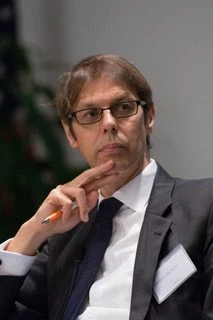Stefaan Verhulst: Unlocking Private Data for Public Good
July 21, 2017


In his role as co-founder and chief research and development officer of The Governance Lab (The GovLab), Stefaan G. Verhulst and his team have done a lot of work with open data. The GovLab is a research center based at New York University’s Tandon School of Engineering that explores how we can change the way we govern using new technology. And it has recently released a comprehensive report illustrating many of the ways open data is improving lives for people in developing economies.
This year, as a member of the Program Committee for Bloomberg’s upcoming Data for Good Exchange on September 24, 2017, Verhulst is hoping to steer the conversation a bit more toward private data. “Corporations have a lot of data that, if unlocked in one way or another, could be used for a variety of public good objectives,” says Verhulst, who has been active in the Data for Good Exchange since it began in 2014. “I see the Data for Good Exchange as an annual milestone in the whole movement to understand how data can improve people’s lives,” he says.


Verhulst identifies three main hurdles to fulfilling the potential of private data to be used for public good. First, he says, is that corporations rarely recognize the public value that corporate data can have. This is partly because the uses are as varied as the entities that hold the data. Data from telecommunications companies, for example, could be used during a natural disaster to better understand how populations are moving within and into or out of the affected zones. Data from ride-hailing companies could help municipalities better understand how residents of a city are getting around, shining a light on public transportation needs. But because corporations don’t generally understand how their data could be used for public good, says Verhulst, “There is quite often no imagination of what the value of private data might be.”
Second, says Verhulst, even when corporations do begin to understand the public use cases of the data they’ve collected, they don’t know how to respond to requests. “There’s no person within corporations right now with the title of data steward,” says Verhulst. Chief data officers are generally in charge of figuring out how data can be used to create a competitive advantage, says Verhulst, but they aren’t looking at data for non-corporate purposes. Often, someone in marketing or in corporate social responsibility is left to respond to requests. But those staffers are short on best practices or even guidelines to help them navigate security and privacy concerns.
The last big hurdle, Verhulst says, is matching the supply of data with the demand. Even the best-meaning, most-organized corporations can’t let simply anyone access their data, which increasingly is the basis of their competitive advantage. And even if they were willing, there’s no guarantee that the data would be understandable to anyone else.
Some responses to this last problem, say Verhulst, have included data pools, where multiple private corporations have incentives to share their data because they know others are doing the same. Some organizations open up their data and then offer a prize for the best insight to come from it. Many create APIs, while still others assign an intermediary to handle the request and perform the analysis. “For the moment, everyone is experimenting,” says Verhulst. “There is a need to understand the model that works best for each organization and the variety of different requests.” Increasing insight on how to leverage corporate data for public good is a key focus of The GovLab’s program on Data Collaboratives.
Verhulst sees the Data for Good Exchange as an ideal place to raise these issues and begin to hash out solutions. Other conferences, say Verhulst, tend to be geared toward either highly technical people or policy makers. “This conference succeeds in bringing together the policy wonks and the nerds, and documenting progress over time,” says Verhulst. “One important element of change is that there is a movement that sustains itself over time and meets at set occasions. This is a community-building exercise.”